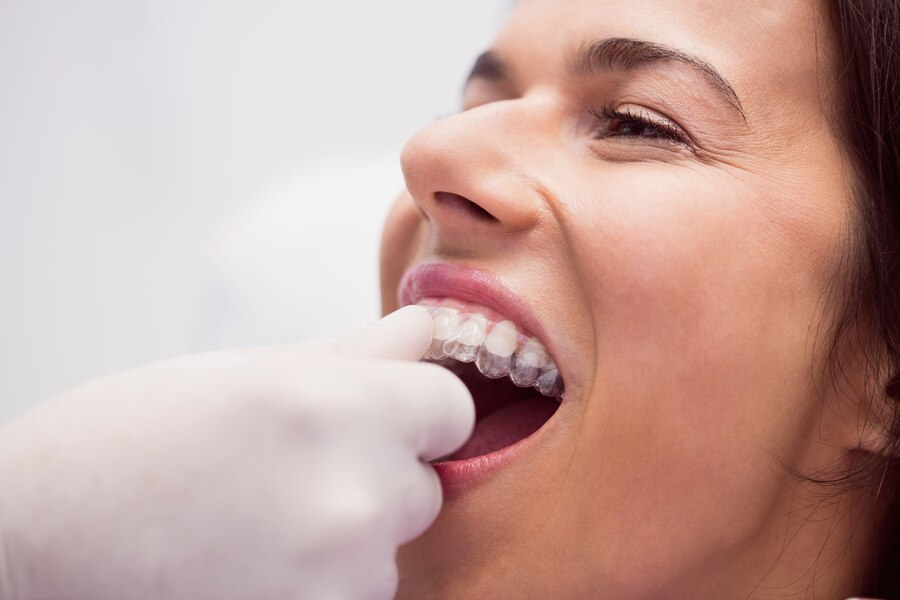
Common Orthodontic Treatment Challenges And How To Overcome Them ** ( Apr 15, 2024 )
Category : Orthodontic Treatment
Orthodontic treatment is a transformative process that can help achieve a healthy and beautiful smile. However, as with any medical treatment, there can be challenges along the way. In this article, we will discuss some of the most common challenges that patients may encounter during orthodontic treatment and provide tips on how to overcome them.
Discomfort and Pain
One of the most common challenges patients face during orthodontic treatment is discomfort and pain, especially in the first few days after braces are fitted or adjusted.
Pain Management: Over-the-counter pain relievers, such as ibuprofen or acetaminophen, can help alleviate discomfort.
Cold Compress: Applying a cold compress to the outside of the mouth can help reduce swelling and numb the affected area.
Soft Foods: Eating soft foods during the initial adjustment period can minimize discomfort.
Oral Irritation
Braces and other orthodontic appliances can cause irritation to the lips, cheeks, and gums.
Orthodontic Wax: Applying orthodontic wax to the brackets or wires can help prevent irritation and soothe sensitive areas.
Rinse with Saltwater: Rinsing with warm saltwater can promote healing and reduce irritation.
Stay Hydrated: Drinking plenty of water can keep the mouth moist and reduce the risk of irritation.
Oral Hygiene Challenges
Maintaining good oral hygiene with braces or other appliances can be challenging due to food particles and plaque getting trapped around the hardware.
Brush and Floss Regularly: Use a soft-bristled toothbrush and floss daily to keep your teeth and gums clean.
Interdental Brushes: Consider using interdental brushes to clean between brackets and wires effectively.
Mouthwash: Antibacterial mouthwash can help reduce plaque buildup and keep your mouth clean.
Difficulty Eating Certain Foods
Certain foods can damage braces or appliances, making it necessary to avoid hard, sticky, or chewy foods during orthodontic treatment.
Modify Your Diet: Opt for soft foods and cut your food into smaller pieces to make chewing easier.
Avoid Problematic Foods: Stay away from foods that can damage braces, such as popcorn, nuts, gum, and chewy candies.
Speech Impediments
Some orthodontic appliances, such as lingual braces or palatal expanders, can temporarily affect speech.
Practice Speaking: Reading aloud or speaking slowly can help you adjust to the appliance and improve your speech.
Communication with Your Orthodontist: If the speech impediment persists, talk to your orthodontist for potential adjustments to the appliance.
Orthodontic Emergencies
Orthodontic emergencies, such as a broken bracket or wire, can be a challenge during treatment.
Temporary Fix: Use orthodontic wax or a small piece of gauze to cover sharp edges until you can see your orthodontist.
Contact Your Orthodontist: Reach out to your orthodontist for guidance and schedule an appointment for a repair.
Adjusting to Clear Aligners
Clear aligners, such as Invisalign, offer a discreet alternative to traditional braces, but they come with their own set of challenges.
Consistency: Wear your aligners as prescribed (usually 20-22 hours per day) to achieve the desired results.
Proper Care: Remove your aligners when eating or drinking (except for water) and clean them regularly.
Stay Organized: Keep track of your aligners and change them according to the treatment schedule.
Compliance and Motivation
Orthodontic treatment requires patience and discipline, as progress can be slow, and the treatment duration can vary.
Set Goals: Keep your end goals in mind and celebrate milestones along the way.
Stay Informed: Understanding the treatment process can help keep you motivated and on track.
Communicate with Your Orthodontist: Regular check-ins with your orthodontist can help you stay motivated and informed about your progress.
Financial Challenges
Orthodontic treatment can be a significant investment, and the cost can be a concern for some patients.
Payment Plans: Many orthodontic offices offer payment plans to make treatment more affordable.
Insurance Coverage: Check with your insurance provider to see if orthodontic treatment is covered.
Flexible Spending Accounts: Consider using a flexible spending account (FSA) or health savings account (HSA) to pay for treatment.
Conclusion
Orthodontic treatment can present challenges, but with the right approach and support, they can be managed effectively. Maintaining open communication with your orthodontist and following their recommendations can help you overcome these challenges and achieve a healthy, beautiful smile. With patience and diligence, you can successfully navigate the orthodontic treatment process and enjoy the benefits of a straighter smile.
© 2021 Punhani Tooth Care. Crafted with by SINFOME
